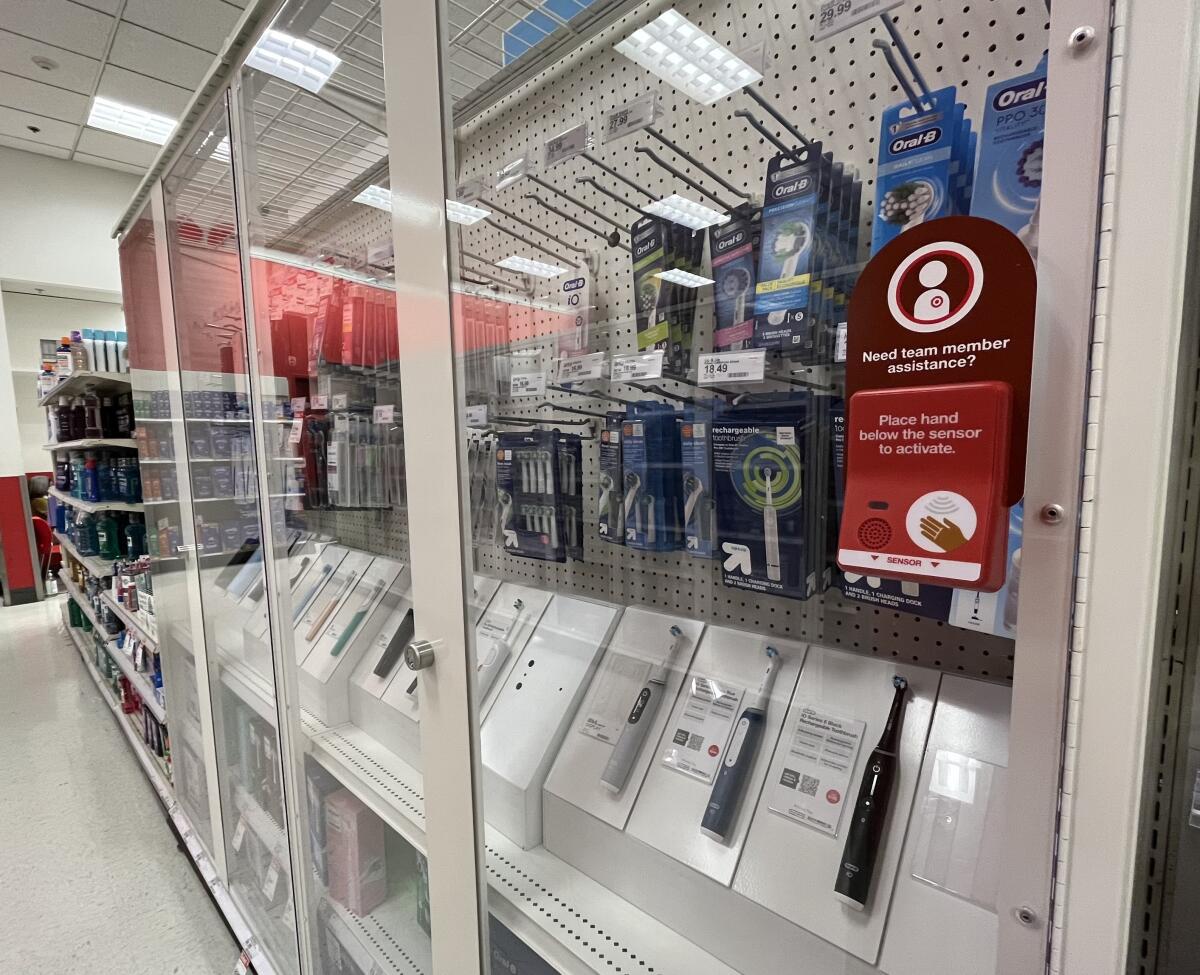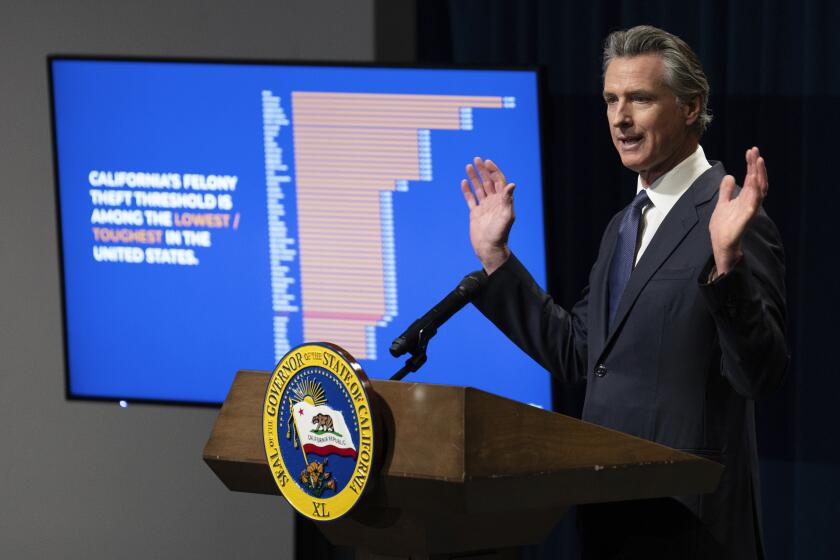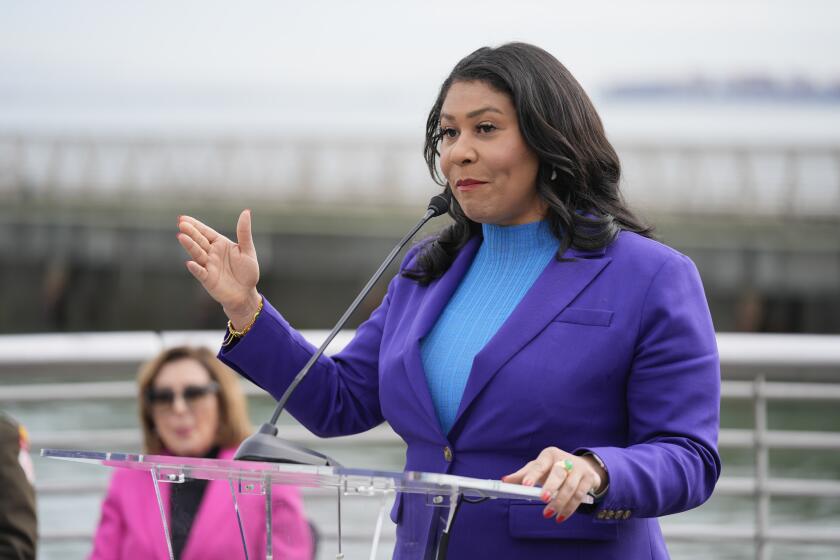Can California curb retail theft without changing Prop. 47? Assembly Democrats unveil their plan

- Share via
SACRAMENTO — Two approaches are gaining traction as California confronts the issue of retail theft, which was propelled to the top of the state’s political agenda this year by viral videos of smash-and-grab robberies and the proliferation of drugstores locking up basic goods.
Assembly Speaker Robert Rivas (D-Hollister) on Tuesday threw his weight behind a package of bills that aim to thwart theft by, among other proposals, allowing restraining orders to keep people who steal away from certain stores and letting prosecutors aggregate the value of thefts across multiple incidents in determining criminal charges.
Meanwhile, supporters of an initiative paid for by big retailers are preparing to submit signatures this month to put a measure on the November ballot that would tackle the problem through harsher criminal penalties for repeat offenders and court-mandated diversion programs for drug users.
The question now is whether the two sides will negotiate a middle ground or if both approaches will advance this year, setting the stage for a fight at the ballot box.
The crux of the issue is a debate over whether California can curb theft without changing Proposition 47, the liberal criminal justice measure voters approved in 2014 that reclassified some felony drug and theft offenses under $950 as misdemeanors. Rivas and Democratic Gov. Gavin Newsom believe they can enact new laws to address theft while leaving Proposition 47 intact. Supporters of the initiative backed by big-box stores and prosecutors believe that repealing parts of Proposition 47 is crucial to solving the problem.
“There’s no turning back the clock on the criminal justice reforms that have been enacted,” Rivas said Tuesday during a news conference at the Capitol. “It’s understanding the root causes of this problem, which is complex. And for us, each one of these bills gets after those layers of complexity.”
Rivas dismissed proposals that would require changing Proposition 47, sending The Times a statement saying that “going to the ballot to address retail crime or theft is not necessary, because the Assembly’s bipartisan and comprehensive plan delivers real and urgent changes for Californians.”
A legislative package in California will focus on so-called organized retail theft crime rings, which are blamed for the uptick in the high-profile, smash-and-grab incidents plaguing the state.
Rachel Michelin, president of the California Retailers Assn., appeared alongside Rivas in a signal of her group’s support for the legislation. But she sees the bills as one option on the table in addition to the ballot initiative.
“California is a very political state, this is a very political situation, but it’s about how do we find solutions?” she told the Times. “Whether it’s a ballot initiative or a legislative package, what has the best chance of having results?”
The ballot initiative called the Homelessness, Drug Addiction and Theft Reduction Act seeks to change Proposition 47 in numerous ways. It would elevate the third time someone commits retail theft to a felony charge. It also would allow prosecutors to aggregate the value of stolen goods so that a person could be charged with a felony for multiple thefts that add up to at least $950. It would add fentanyl to a law that prohibits the possession of hard drugs while armed with a loaded firearm. It also would require drug treatment the third time a person is charged with simple drug possession.
“We can’t fix this without going back to the ballot box,” said Bobbie Singh-Allen, president of the American Petroleum and Convenience Store Assn., a supporter of the initiative, which represents nearly 2,000 convenience stores in California. “We don’t want to just leave it to the Legislature.”
The governor said he can relate to business owners and other residents angered by waves of smash-and-grab thefts from California stores.
The ballot initiative has already raised more than $7 million since October and is largely funded by retailers including Target, Walmart, 7-Eleven and Home Depot, according to campaign finance records. The prosecutor-led initiative has been largely backed by law enforcement and Republican elected officials, but recently received support from Democrats including San Francisco Mayor London Breed.
Greg Totten, chief executive of the California District Attorneys Assn. and a supporter of the initiative, told The Times that he is confident it will qualify for the November ballot. The deadline to submit signatures is April 23.
A law passed in 2014 gives the Legislature a chance to hold hearings and negotiate with initiative sponsors over policies that could entice them to pull their measures off the ballot. Totten said his campaign stands “ready to negotiate anytime, place or under any circumstances.”
Rivas did not answer The Times’ question about whether he will hold a public hearing on any potential negotiations.
The state Senate is also considering a package of bills to address the growing fentanyl crisis and organized retail theft. Lawmakers have until the end of August to decide which bills they want to send to Newsom.
Mayors London Breed of San Francisco and Matt Mahan of San Jose have endorsed a tough-on-crime ballot measure effort to reform Proposition 47.
The Assembly bill package has support from progressive groups that back California’s criminal justice reforms.
“Rather than simply seeking to score quick and cheap political points, the package reflects a commitment to pursuing solutions that would reduce the incidents of theft in the first place,” Tinisch Hollins, executive director of Californians for Safety and Justice, said in a statement.
These are the bills Rivas intends to prioritize:
- Assembly Bill 2943, co-authored by Rivas and Assemblymember Rick Chavez Zbur (D-Los Angeles), is a nod to Newsom’s suggestions for how the state should try to curb theft. The bill addresses serial thieves, aggregates dollar amounts and expands drug diversion programs. Parts of this bill address similar issues in the ballot initiative.
- Assembly Bill 1794 by Assemblymember Kevin McCarty (D-Sacramento) would allow prosecutors to aggregate theft crimes by the same perpetrator even when they involve different places and victims. It also would streamline the process of reporting shoplifting incidents directly to prosecutors through a statewide program called “CAL Fast Pass.”
- Assembly Bill 1845 by Assemblymember Juan Alanis (R-Modesto) is the only Republican bill in the package and would expand the California Highway Patrol’s property crimes task force program to include cargo theft and railroad police.
- Assembly Bill 3209 by Assemblymember Marc Berman (D-Menlo Park) would allow a court to impose a restraining order for up to two years against a person who has stolen, vandalized or committed battery against an employee. It would also require the court to consider whether a person lives in a “food desert” and whether the store is the only location for necessities.
- Assembly Bill 1779 by Assemblymember Jacqui Irwin (D-Thousand Oaks) is co-sponsored by the California District Attorneys Assn. It would allow prosecutors to charge several offenses that took place across counties and handle them in a single court.
- Assembly Bill 1802 by Assemblymember Reggie Jones-Sawyer (D-Los Angeles) would make permanent the California Highway Patrol property crimes task force. Los Angeles County Dist. Atty. George Gascón sponsored this bill.
- Assembly Bill 1960 by Assemblymember Esmeralda Soria (D-Fresno) would enhance penalties for a person who takes or destroys property valued at more than $50,000 . Supporters include the Merced County district attorney, the California District Attorneys Assn. and the Orange County District Attorneys Assn.
More to Read
Sign up for Essential California
The most important California stories and recommendations in your inbox every morning.
You may occasionally receive promotional content from the Los Angeles Times.














